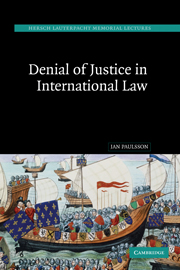Book contents
- Frontmatter
- Table of Contents
- Acknowledgements
- Authorities
- Abbreviations
- 1 The renaissance of a cause of action
- 2 The historical evolution of denial of justice
- 3 Three fundamental developments
- 4 The modern definition of denial of justice
- 5 Exhaustion of local remedies and denial of justice
- 6 Denial of justice by outside interference
- 7 Denial of justice by the decision-maker
- 8 Remedies and sanctions
- 9 The menace of ‘obscure arbiters’?
- Bibliography
- Index
7 - Denial of justice by the decision-maker
Published online by Cambridge University Press: 29 July 2009
- Frontmatter
- Table of Contents
- Acknowledgements
- Authorities
- Abbreviations
- 1 The renaissance of a cause of action
- 2 The historical evolution of denial of justice
- 3 Three fundamental developments
- 4 The modern definition of denial of justice
- 5 Exhaustion of local remedies and denial of justice
- 6 Denial of justice by outside interference
- 7 Denial of justice by the decision-maker
- 8 Remedies and sanctions
- 9 The menace of ‘obscure arbiters’?
- Bibliography
- Index
Summary
Refusal to judge
It may appear odd that a national court ill disposed towards a foreigner would refuse to decide. Why would an antagonistic judge not rather render an unfavourable judgment or order?
The answer may be that the adverse judgment is difficult to justify, and – most of all – open to appeals before higher jurisdictions less likely to protect parochial interests. Such a chauvinistic impulse may explain the fate that befell the engineering firm Revpower Limited in 1993 when it sought to enforce an award rendered in Shanghai against a Chinese state-owned enterprise based in that city (the Shanghai Far-East Aero-Technology Import and Export Corporation). Its application for enforcement was filed with all requisite supporting documents in the Intermediate People's Court. Since China was bound by the New York Convention on the Recognition and Enforcement of Foreign Arbitral Awards, a decree of enforcement should in principle have been forthcoming. Instead, the assigned judge simply refused to put the case on the docket. If Revpower had had access to an international forum, it could plainly have held the central government internationally responsible for the denial of justice.
As one might expect, a malingering court is likely to make some show of activity. The international tribunal then faces the challenge of determining whether there was in fact a disguised refusal to deal with the case.
- Type
- Chapter
- Information
- Denial of Justice in International Law , pp. 176 - 206Publisher: Cambridge University PressPrint publication year: 2005



